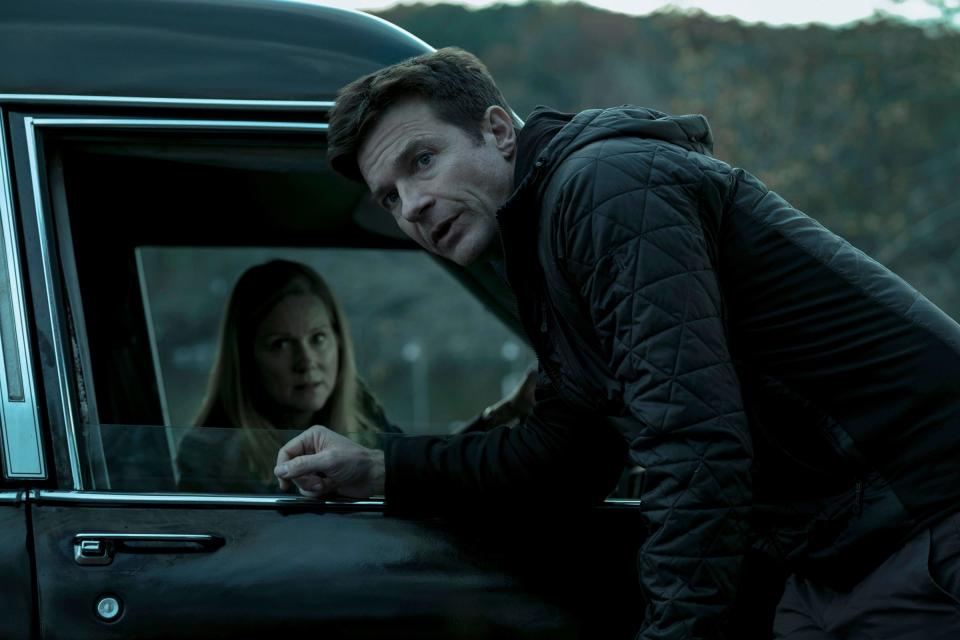Opinion: TV serves up despicable people and cynicism. I need heroes and hope
- Oops!Something went wrong.Please try again later.
A friend wrote last week on social media that he was eagerly awaiting the return of the most despicable family on television. He was referring to “Ozark,” the drama about a financial adviser who “drags his family from Chicago to the Missouri Ozarks, where he must launder $500 million in five years to appease a drug boss,” as Netflix describes it.
The fourth and final season arrived Friday. After finishing the second episode, my friend joked that he had found a family worse than the Trumps. Worse than the "Succession" family? someone asked. Good question, my friend replied.
No thanks to both. Not even with Jason Bateman and Laura Linney heading the “Ozark” clan and certainly not the “Succession” crew that includes, according to Rotten Tomatoes, “some of television’s least likable characters.” A “highly dysfunctional dynasty,” HBO says, headed by an aging CEO dad who runs “one of the world's largest media and entertainment conglomerates.”
There’s a real Murdoch family and a real Fox News wrecking crew. This doesn’t count as escapism in my book.
Despicable people are popular
There’s never been a more desperate need for escapism than these last few years. From the moment Donald Trump rode down a golden escalator in 2015 to declare his presidential candidacy to now, as we enter the third year of the COVID-19 pandemic, real life has ranged from hard to stomach to unbearably tragic. We must all find our escapism where we can.
These shows about awful people — “Ozark,” “Succession,” Showtime's “Billions” (“a convincing fable of greed, power and competition"), Paramount’s “Yellowstone” (more nasty rich people, judging from the episode I watched) — are big hits with audiences and critics alike.

Same goes for BBC America’s “Killing Eve.” It's a drama (or is it a comedy?) about stone-cold killers and a purported heroine who is the target of the title. Eve, Sandra Oh’s MI5 security agent, is unprofessional and incompetent (I mean, who gets sexually attracted to their aspiring assassin?).
Who do we cheer for? Who cares? The 87% Rotten Tomatoes audience rating is practically on par with the 89% critic rating.
I’m an outlier, and I think I know why. For decades I flew all over the country to report on candidates and campaigns. But I was nervous about flying. I used candy, corn chips and other junk food to distract myself from where I was and what was happening. When I inevitably gained weight, I realized escapist reading — thrillers, mysteries and romantic suspense — could accomplish the same purpose.
In search of comfort
My quest to escape also led to a brief experiment with Hallmark. That ended years ago, when I noticed that producers seemed to use the same set or block as a small-town downtown in every show, majestic mountains were the backdrop for a series set on the Chesapeake Bay (what, you’ve never seen them?), and the dialogue was often cringeworthy.
Yet the need to escape is stronger and more enduring than ever. For me, these Trump and COVID times are like a plane ride that requires years of distraction — preferably the kind you can summon on demand at home if you aren’t up for mingling, masking and wondering if anyone within breathing range is infected.
I’ll never be like my many friends who enjoy the exploits of the rich, cold, calculating and in some cases pure evil. Exhibit A: Over 10 seasons, I’ve watched every single “Call the Midwife” episode and Christmas special on PBS.
It’s not perfect. In fact, it’s sometimes overly gynecological (how many graphic births does even this show need?), and while its nuns and civilian nurses are three-dimensional, it is saccharine in its portrayal of a Black couple, complete with a trite recurring musical theme.
Comfort in closure as well as escape
On the other hand, as it moves through the upheavals of the 1950s and 1960s, “Call the Midwife” has featured scores of people wrestling with war trauma, poverty, alcoholism, immigration, cultural dislocation, thalidomide babies, unwed motherhood, homosexuality, abortion, the birth control pill. They are well worth caring about.
But the show is a little too earnest even for me sometimes.
I’m looking forward to the return of the triumphantly feminist “Marvelous Mrs. Maisel” on Amazon Prime. And I don’t want to miss the next “The Good Fight” season on Paramount Plus. The credits, the hallucinations, the cartoons set to songs — it’s a surreal, hilarious take on our times. And anything that makes me laugh at our times is a win.
By far, however, my most reliable distractions in this pandemic have been procedurals, among them “Shetland” in Scotland, “Bosch” in Los Angeles, “Van der Valk” in Amsterdam, “Unforgotten” in London, “Endeavour” in Oxford, “Grantchester” in South Cambridgeshire, and “Line of Duty” in some fictional British location. They star cops, detectives and a couple of vicars who are committed to crime solving and, despite their flaws, easy to root for.
Tragedy is inevitable, but justice usually is done. There is, in other words, closure. And that may be why I’m so attached to these formulaic procedurals. Closure is what I most want, and is most elusive, when it comes to both Donald Trump and COVID-19.
Jill Lawrence is a columnist for USA TODAY and author of "The Art of the Political Deal: How Congress Beat the Odds and Broke Through Gridlock." Follow her on Twitter: @JillDLawrence
This article originally appeared on USA TODAY: Opinion: COVID escapism: Feminists, detectives trump 'Ozark'

